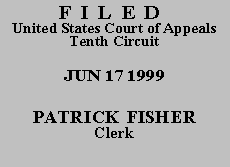

| ANTHONY JOE THANNISCH,
Petitioner-Appellant, v. H. N. SCOTT, |
|
Anthony J. Thannisch, a state prisoner appearing pro se, seeks a certificate of appealability to appeal the district court's dismissal of his 28 U.S.C. § 2254 habeas petition. As Thannisch has failed to make a "substantial showing of the denial of a constitutional right," 28 U.S.C. § 2253(c)(2), we deny a certificate of appealability and dismiss the appeal.
On April 24, 1996, Thannisch was transferred from an Oklahoma state penitentiary to a private prison housing Oklahoma inmates pursuant to a contract with the state. He filed a writ of mandamus in state court alleging the transfer resulted in a diminished opportunity for him to earn good-time credits because the private facility did not offer "public works jobs" for which state prisoners were given reductions in sentences. The court denied his request on November 24, 1997. Thannisch apparently filed an identical petition with the Oklahoma Court of Criminal Appeals and the court denied relief on January 15, 1998. He filed the instant federal habeas petition on February 23, 1998, asserting the same grounds as those raised in his state mandamus petitions. The district court denied the habeas petition after concluding the applicable Oklahoma good-time credits regulations did not bestow any property or liberty interests upon inmates.
The Supreme Court has held there is no independent constitutional liberty interest in a state's good-time credit scheme. Hewitt v. Helms, 459 U.S. 460, 467 (1983). Nor does the Constitution create any property or liberty interest in prison employment. Ingram v. Papalia, 804 F.2d 595, 596 (10th Cir. 1986) (per curiam).
Although states may in some circumstances create liberty interests protected by the Due Process Clause, the liberty interest created by prison regulations "will generally be limited to freedom from restraint which . . . imposes atypical and significant hardship on the inmate in relation to the ordinary incidents of prison life."
Penrod v. Zavaras, 94 F.3d 1399, 1406 (10th Cir. 1996) (per curiam) (quoting Sandin v. Connor, 515 U.S. 472, 484 (1995) (alteration in original)).
Further, the Oklahoma statutes governing inmate good-time credits do not guarantee that inmates will receive work-time credit or that inmates will be provided an opportunity to work. See Okla. Stat. Ann. tit. 57, §§ 138, 224 (West 1991).(1) Thus, an inmate's transfer from an institution offering such opportunities to one that does not implicates no constitutional rights. See Meachum v. Fano, 427 U.S. 215, 229 n.8 (1976). The assignment of inmates is expressly committed by section 224 to the discretion of prison authorities. As we noted in Twyman v. Crisp, the work-time credit program
simply provides that if [a prisoner] does work he will receive work-time credits. At an institution with a large inmate population there are jobs for only a limited number of prisoners. Therefore, it cannot be said Oklahoma law creates any right to work-time credits which amounts to a liberty or property interest.
584 F.2d 352, 357 (10th Cir. 1978) (per curiam) (quoting Gardner v. Benton, 452 F. Supp. 170, 177 (E.D. Okla. 1977)).
Thannisch's application for a certificate of appealability is DENIED and his appeal is DISMISSED. The mandate shall issue forthwith.
Entered for the Court
Mary Beck Briscoe
Circuit Judge
*. This order and judgment is not binding precedent, except under the doctrines of law of the case, res judicata, and collateral estoppel. The court generally disfavors the citation of orders and judgments; nevertheless, an order and judgment may be cited under the terms and conditions of 10th Cir. R. 36.3.
1. Although these statutes were amended substantially following Thannisch's conviction, the earlier versions also bestowed no such rights on state inmates. See Okla. Stat. Ann. tit. 57, §§ 138, 224 (West 1981).